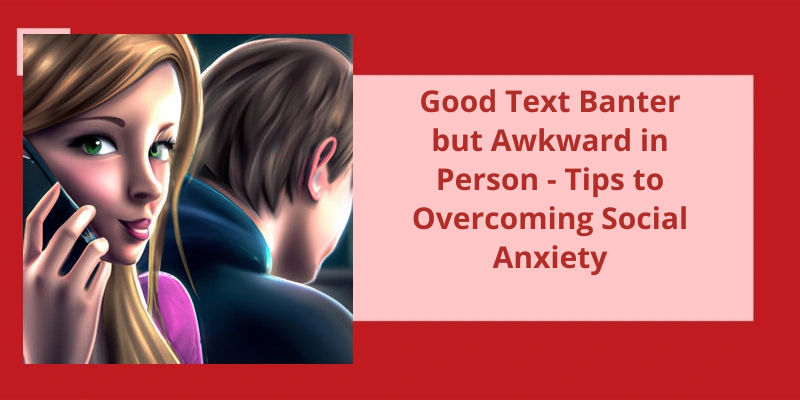Effective and entertaining text banter has been widely regarded as a crucial component in establishing meaningful connections in the digital era. It provides a platform for individuals to showcase their wit, charm and humor, all while establishing a rapport and building a sense of comfort between two individuals. However, for many individuals, the ability to maintain that same level of engagement, confidence and overall chemistry can falter when face-to-face interactions arise. This can lead to a number of awkward social encounters, presenting unique challenges that often require a different set of skills and strategies to overcome. Despite this, those able to effectively navigate the difference between text banter and in-person communication can greatly enhance their ability to establish and maintain genuine relationships.
Is It OK to Confront Someone via Text?
The first step in confronting someone via text is to identify the issue at hand. It’s important to clearly state your concern in a concise and direct manner. Avoid vague statements or beating around the bush as this can lead to confusion and further frustration. It may also be helpful to take a moment to reflect on the situation and consider the other persons perspective. By doing so, you may gain a better understanding of their actions and be able to approach the conversation with a more open mind.
Once you’ve identified the issue, it’s important to choose your words carefully. While being direct is important, it’s equally important to be respectful and considerate of the other persons feelings. Avoid using accusatory language or making assumptions about their intentions. Instead, focus on how their actions have affected you and express your emotions in a calm and non-confrontational manner. Remember that the goal of the conversation isn’t to assign blame or prove a point, but rather to find a mutually agreeable solution.
Another key aspect of confronting someone via text is to be mindful of the tone of your messages. Without the benefit of facial expressions or body language, it can be difficult to convey sarcasm or humor in a way that isn’t misinterpreted. Avoid using excessive punctuation or capital letters, which can come across as aggressive or confrontational. Instead, opt for a calm and even tone that conveys your message clearly without adding unnecessary emotion.
It may also be helpful to establish boundaries and expectations for the conversation upfront. Let the other person know that you’re open to hearing their point of view but that you expect a respectful and constructive dialogue. If at any point the conversation becomes heated or unproductive, it’s important to take a step back and reassess your approach. Remember that the goal is to resolve the issue at hand, not to win an argument or prove a point.
Be direct and concise, choose your words carefully, and be mindful of your tone throughout the conversation. With these tips in mind, you can address difficult situations head-on and work towards finding a solution that’s mutually beneficial.
When it comes to confronting someone, it’s important to consider the best approach in order to achieve the desired outcome. While some may argue that face-to-face communication is always the best option, there are certainly instances where texting can be more beneficial. Instead of immediately dismissing the idea of texting as a means of confrontation, it’s worth considering the advantages and disadvantages of each method.
Is It Better to Confront Someone in Person or Over Text?
When you confront someone in person, youre putting both yourself and the other person in an uncomfortable and potentially dangerous situation. People react differently when theyre angry or upset, and it’s hard to predict how theyll react. They might become aggressive, and things could quickly spiral out of control. On the other hand, if you confront someone over text, you’ve the ability to think about your words and respond in a calm and constructive manner.
It’s easier to communicate your message when you’ve time to think about what you want to say, rather than blurting things out in the heat of the moment. You can choose to end the conversation if it’s not productive, or you can block the person if they continue to harass or disrespect you.
Of course, there are some instances where confronting someone in person might be necessary. For example, if youre dealing with a serious issue like abuse, it’s important to involve other people and seek help. Similarly, if youre in a professional setting and need to confront a coworker, it’s best to do so in person and with a mediator present. In these cases, face-to-face communication can help you come to a resolution and ensure that everyone is on the same page.
If youre someone who feels more comfortable expressing themselves through writing, then it makes sense to choose text. However, if you value face-to-face communication and believe that it’s more effective, then confronting someone in person might be the way to go. Ultimately, the goal of confronting someone is to resolve the issue at hand and move forward in a positive way, whether thats through text or in person.
Source: How To Use Texts For Awkward Conversations – Elite Daily
Texting is a convenient form of communication, but bad texting behavior can quickly turn it into a frustrating experience. Some common signs of bad texting include long and convoluted messages, excessive use of emojis or punctuation, and unclear or absent tone. In some cases, bad texters can also be guilty of bombarding your phone with constant messages. In order to make the most out of texting, it’s important to establish clear communication standards and avoid these bad texting habits.
What Is Considered Bad Texting?
When it comes to texting, there are certain etiquette standards that should be followed. Bad texters tend to break these rules and make the texting experience unpleasant for the other party. One common trait of a bad texter is their tendency to write long, rambling messages. These messages can be confusing and overwhelming, and the recipient may struggle to understand the point they’re trying to make. Additionally, bad texters may use incorrect grammar and spelling, making their message difficult to understand.
Perhaps the most frustrating trait of a bad texter is their tendency to blow up your phone. Bad texters may send numerous messages in a short amount of time, overwhelming the recipients inbox and causing unnecessary stress or anxiety. They may also expect immediate responses, leading to added pressure for the recipient to constantly check their phone. This can be especially frustrating when the messages aren’t urgent or important.
Lastly, bad texters often fail to communicate tone effectively. This can occur when they use ambiguous language or fail to convey their intended emotion. As a result, the recipient may be unclear if the sender is angry, sarcastic, or joking. This can lead to miscommunications and hurt feelings, as the recipient may interpret the message in a way that was not intended.
The Impact of Bad Texting on Relationships (Friends, Romantic Partners, Co-Workers, Etc.)
The way we text can have a negative effect on our relationships with friends, romantic partners, co-workers, and others. Poor texting etiquette such as being aggressive, using too many abbreviations, or ignoring messages can cause misunderstandings or hurt feelings. It’s important to communicate clearly and respectfully when texting to maintain healthy relationships.
However, the reality is that many people find it easier to communicate over text than in person. This can be attributed to various factors, including the anonymity and distance provided by digital communication.
Why Is It Easier to Talk on Text Than in Person?
One major reason why it’s easier to talk on text than in person is because text-based communication offers a certain level of emotional distance. People are often more comfortable stepping outside of their comfort zones because they’re able to hide behind a screen. They can take a little more time to compose their messages, think about what they want to say, and then carefully craft their responses. This can help them feel more confident and in control of the conversation.
With smartphones and instant messaging apps, people are able to send messages all day long. These platforms have become a part of our daily lives, allowing us to communicate with more ease.
Texting also allows people to be more vulnerable without feeling exposed. They can open up about their thoughts and feelings without the added pressure of reading peoples facial expressions or body language. When people text, they only have to worry about the words they’re using, which can be less intimidating for some people. In a way, texting can help people communicate more honestly and openly than they may be able to in person.
Understanding these advantages can help people communicate more effectively and feel more confident in their conversations, whether they’re texting or speaking face to face.
When it comes to communicating through text, it’s inevitable that you’ll encounter an awkward moment or two. But don’t let the discomfort get the best of you – humor can actually come to your rescue. With a little bit of wit and a dash of cleverness, you can easily turn an uncomfortable exchange into a lighthearted and enjoyable conversation with just a few well-timed quips. So the next time you find yourself in an awkward text exchange, remember to inject some humor and keep the conversation going!
When Text Conversations Get Awkward?
Texting is the most convenient way of communication nowadays. It’s quick, easy, and efficient. However, there are times when texts can cause a fair share of awkwardness. It could be due to misinterpretation of texts, long pauses, or simply a topic thats difficult to discuss. Whatever the reason may be, awkward text conversations could lead to an early end to what could have been a great conversation.
When things take that awkward turn in your text conversation, humor is your ally. Laughing at the situation or at yourself can help relax the tension and take the pressure off your shoulders. A well-placed joke can level the playing field and make the atmosphere more comfortable. A chuckle or laughter can create a positive vibe and improve the communication between you and your text buddy. A little self-deprecating humor could also make things less awkward.
To prevent text conversations from becoming awkward, try to pay attention to how the conversation is flowing; if there are any awkward silences or abrupt topic changes, then try to redirect the conversation smoothly. Add some fun jokes, memes, or even amusing GIFs related to the topic you’re discussing. It’s not just about being funny but also being able to keep the conversation going smoothly.
If things get too awkward for you, don’t hesitate to call it a day. You can politely end the conversation or answer slowly, so the person on the other end knows that your interest in the conversation has waned. Similarly, if youre on the receiving end of an awkward conversation, try not to take it too seriously. Acknowledge the awkwardness, and use the opportunity to lighten the mood with some humor.
Awkward text conversations can happen, but humor can be your best friend in such situations. Just point out the elephant in the room and laughing together can make it easier for everyone involved. Remember, texting should be fun and enjoyable. Don’t let an awkward conversation ruin your day. If the conversation can’t be saved, it’s always best to end it on a positive note.
Tips for Initiating Text Conversations That Are More Likely to Flow Smoothly and Avoid Awkwardness.
- Start with a light-hearted or humorous message to break the ice.
- Ask open-ended questions that allow for more detailed and personal answers.
- Show interest in their hobbies or interests by asking about them.
- Use references to previous conversations or shared experiences to keep the conversation flowing.
- Avoid controversial or sensitive topics that could create tension or discomfort.
- End the conversation with a positive note or suggestion for future communication.
Conclusion
In conclusion, it’s evident that good text banter doesn’t automatically translate to smooth in-person interactions. While technology has provided us with various modes of communication, it’s also led us to rely on digital devices to express ourselves. As a result, we may lack the necessary social skills that come with face-to-face interaction. To overcome this hurdle, individuals must learn to strike a balance between their digital and real-life persona. They should also work on building their confidence and communication skills to avoid potential awkwardness during in-person conversations. In essence, being charming in text messages is one thing, but the ability to charm in person is what truly counts.






